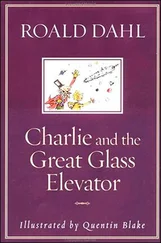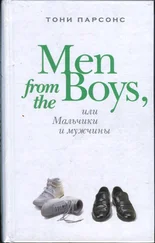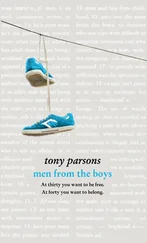Roald Dahl - Man from the South
Здесь есть возможность читать онлайн «Roald Dahl - Man from the South» весь текст электронной книги совершенно бесплатно (целиком полную версию без сокращений). В некоторых случаях можно слушать аудио, скачать через торрент в формате fb2 и присутствует краткое содержание. Жанр: Языкознание, Ужасы и Мистика, на английском языке. Описание произведения, (предисловие) а так же отзывы посетителей доступны на портале библиотеки ЛибКат.
- Название:Man from the South
- Автор:
- Жанр:
- Год:неизвестен
- ISBN:нет данных
- Рейтинг книги:4 / 5. Голосов: 1
-
Избранное:Добавить в избранное
- Отзывы:
-
Ваша оценка:
- 80
- 1
- 2
- 3
- 4
- 5
Man from the South: краткое содержание, описание и аннотация
Предлагаем к чтению аннотацию, описание, краткое содержание или предисловие (зависит от того, что написал сам автор книги «Man from the South»). Если вы не нашли необходимую информацию о книге — напишите в комментариях, мы постараемся отыскать её.
Man from the South — читать онлайн бесплатно полную книгу (весь текст) целиком
Ниже представлен текст книги, разбитый по страницам. Система сохранения места последней прочитанной страницы, позволяет с удобством читать онлайн бесплатно книгу «Man from the South», без необходимости каждый раз заново искать на чём Вы остановились. Поставьте закладку, и сможете в любой момент перейти на страницу, на которой закончили чтение.
Интервал:
Закладка:
The mother had just returned from hospital carrying Lexington in her arms when she said to her husband, 'Darling, now you must take me out to a most wonderful restaurant for dinner.'
Her husband kissed her and told her that any woman who could have such a beautiful baby as Lexington deserved to go anywhere she wanted. So that evening they both dressed themselves in their best clothes and, leaving little Lexington in the care of a trained nurse who was costing them twenty dollars a day, they went out to the finest and most expensive restaurant in town.
After a wonderful evening, they arrived back at their house at around two o'clock in the morning. The husband paid the taxi driver and then began feeling in his pockets for the key to the front door. After a while, he announced that he must have left it in the pocket of his other suit, and he suggested they ring the bell and get the nurse to come down and let them in. A nurse who was costing them twenty dollars a day must expect to have to get out of bed occasionally in the night, the husband said.
So he rang the bell. They waited. Nothing happened. He rang it again, long and loud. They waited another minute. Then they both stepped back on to the street and shouted the nurse's name up at the nursery window on the third floor, but there was still no answer. The house was dark and silent. The wife began to become frightened. If the nurse couldn't hear the front doorbell, then how did she expect to hear the baby crying?
'You mustn't worry. I'll let you in.' He was feeling rather brave after all he had drunk. He bent down and took off a shoe. Then, holding the shoe by the toe, he threw it hard and straight through the dining-room window on the ground floor.
'There you are,' he said, laughing. He stepped forward and very carefully put a hand through the hole in the glass and undid the lock. Then he raised the window.
'I'll lift you in first, little mother,' he said, and he took his wife around the waist and lifted her off the ground. Then her husband turned her round and began moving her gently through the open window into the dining room. At this moment, a police car came driving silently along the street towards them. It stopped about thirty metres away and three policemen jumped out of the car and started running in the direction of the husband and wife. The policemen were all holding guns.
'Hands up!' the policemen shouted. 'Hands up!' But it was impossible for the husband to obey this order without letting go of his wife. If he had done this, she would either have fallen to the ground or would have been left half in and half out of the house, which is a very uncomfortable position for a woman; so he continued to push her upwards and inwards through the window. The policemen, all of whom had received rewards before for killing robbers, shot at them immediately. Although the policemen were still running, they hit both bodies several times and killed both of them.
So, when he was no more than twelve days old, little Lexington became an orphan.
The news of this killing was brought to all the relatives of the dead couple by newspaper reporters, and the next morning the closest of the relatives got into taxis and left for the house with the broken window. They gathered in the living room and sat around in a circle, smoking cigarettes and talking about what should be done with the baby upstairs, the orphan Lexington
It soon became clear that none of the relatives wanted responsibility for the child, and they talked and argued all through the day. Everybody declared an enormous desire to look after him, and would have done so with the greatest of pleasure but their apartment was too small, or they already had one baby and couldn't possibly afford another, or they wouldn't know what to do with the poor little child when they went abroad in the summer, or they were getting old, which would surely be very unfair on the boy. They all knew, of course, that the father had been heavily in debt for a long time and that there would be no money at all to go with the child.
They were still arguing at six the next morning when suddenly, in the middle of it all, an old aunt (her name was Glosspan) arrived from Virginia. Without taking off her hat and coat, without even sitting down, she announced firmly to the gathered relatives that she herself intended to look after the baby boy. She would take full responsibility, she said, for the boy's education - and all the costs - and everyone else could go home. She went upstairs to the nursery and took Lexington and went out of the house with the baby held tightly in her arms. The relatives simply sat, stared, smiled and looked content.
And so the baby, Lexington, left the city of New York when he was thirteen days old and travelled southwards to live with Great Aunt Glosspan in the State of Virginia.
Aunt Glosspan was nearly seventy when she took Lexington to Virginia, but you would never have guessed it. She was as youthful as a woman half her age. She had a small, but still quite beautiful face and two lovely brown eyes. But she was a strange old woman. For the past thirty years she had lived alone in a small cottage high up on the slopes of the Blue Ridge Mountains, several kilometres from the nearest village. She had three cows, some fields for them, some land for growing vegetables, a flower garden and a dozen chickens.
And now she had little Lexington, too.
She was a strict vegetarian and thought that eating animal meat was not only unhealthy and disgusting, but cruel too. She lived on foods like milk, butter, eggs, cheese, vegetables, nuts and fruit, and she was happy to think that no creature would ever be slaughtered for her sake.
She did not know very much about babies but that didn't worry her. At the railway station in New York she bought some things for feeding the baby and a book called The Care Of Infants. What more could anyone want? When the train started moving, she fed the baby some milk and laid it down on the seat to sleep. Then she read The Care Of Infants from beginning to end.
Strangely there wasn't any problem. Back home in the cottage everything went well. Little Lexington drank his milk and cried and slept exactly as a good baby should, and Aunt Glosspan was filled with joy whenever she looked at him and she kissed him all day long. By the time he was six years old, young Lexington had become a most beautiful boy with long golden hair and deep blue eyes. He was bright and cheerful, and already he was learning to help his old aunt in all sorts of different ways around the farm, collecting the eggs from the chicken house, making butter, and digging up potatoes in the vegetable garden. Soon, Aunt Glosspan told herself, she would have to start thinking about his education.
But she could not bear the thought of sending him away to school. She loved him so much now that it would kill her to be separated from him for long. There was, of course, that village school down in the valley, but it was a horrible-looking place, and if she sent him there, she was sure they would start forcing him to eat meat as soon as he arrived.
'You know what, my darling?' she said to him one day when he was sitting in the kitchen watching her make cheese. 'I'll teach you myself.'
The boy looked at her with his large blue eyes, and gave her a trusting smile. 'That would be nice,' he said.
'And the first thing I should do is to teach you how to cook.'
'I think I would like that, Aunt Glosspan.'
'You're going to have to learn some time,' she said. 'Vegetarians like us don't have nearly so many foods to choose from as ordinary people, and so they must learn to cook doubly well.'
'Aunt Glosspan,' the boy said, 'what do ordinary people eat that we don't?'
'Animals,' she answered with disgust.
'Do you mean live animals?'
'No,' she said. 'Dead ones.'
Читать дальшеИнтервал:
Закладка:
Похожие книги на «Man from the South»
Представляем Вашему вниманию похожие книги на «Man from the South» списком для выбора. Мы отобрали схожую по названию и смыслу литературу в надежде предоставить читателям больше вариантов отыскать новые, интересные, ещё непрочитанные произведения.
Обсуждение, отзывы о книге «Man from the South» и просто собственные мнения читателей. Оставьте ваши комментарии, напишите, что Вы думаете о произведении, его смысле или главных героях. Укажите что конкретно понравилось, а что нет, и почему Вы так считаете.








